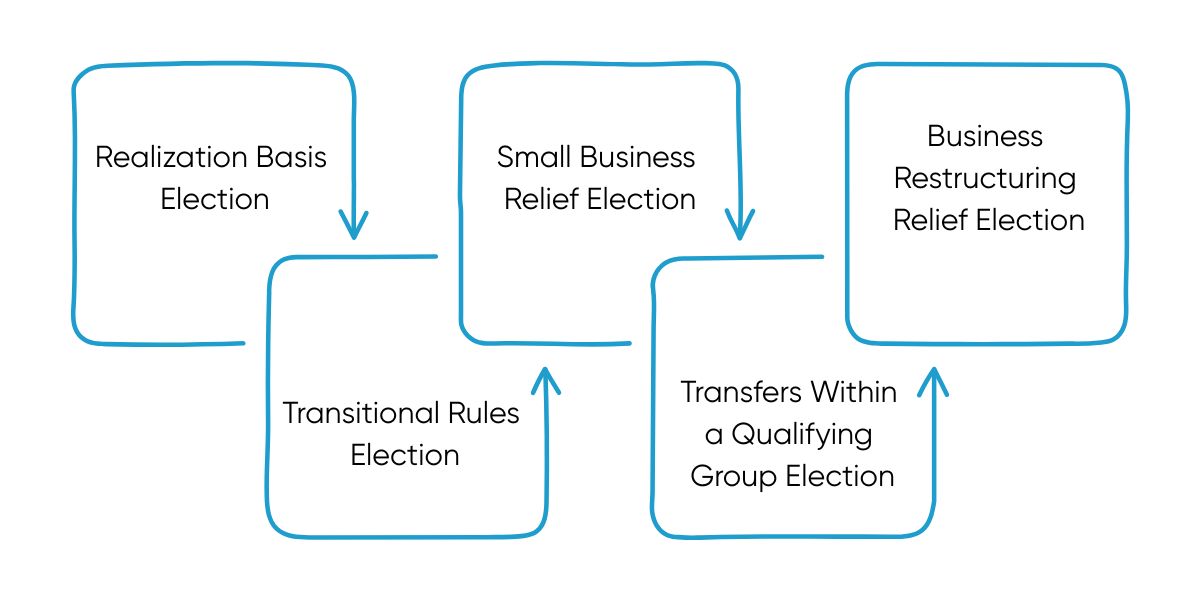Understanding Corporate Tax Elections in the United Arab Emirates
With the implementation of a federal corporate tax system in year 2023 and further conforming to international tax standards with a 15% Domestic Minimum Top-Up Tax (DMTT) for large multinational corporations from year 2025 and a 9% tax on profits over AED 375,000, the United Arab Emirates (UAE) has seen a dramatic change in its tax landscape. A new age of financial openness and compliance businesses have begun with the requirement that over 650,000 entities file corporate tax returns to the Federal Tax Authority (FTA).
Businesses need to be aware of the strategic options available in the tax regime and the subtleties of corporate tax elections. These elections are about more than just following the rules. They are essential for tax planning, risk management, and expanding businesses. However, navigating these options could be difficult. For this reason, UAE businesses currently rely on the professional corporate tax services offered by one of the best audit firms and tax consultants in Dubai, like Premier Auditing & Accounting LLC.
The Key to Smarter Tax Strategies in the UAE
In the UAE, corporate tax elections are specific choices firms make under the tax law to modify their tax obligations in response to their strategic goals and business realities. They allow firms to select how certain income, expenses, or transactions are treated tax-wise, allowing them to delay obligations, avoid double taxation, or simplify compliance.
Making knowledgeable business tax decisions is crucial during the filing process. The risk exposure, cash flow, and tax status of a business can all be significantly impacted by making the right choices. However, elections that are ill-informed or erroneous may result in missed opportunities, compliance issues, or even fines.
Types of Corporate Tax Elections Every UAE Business Should Know
Several essential options are available under the UAE’s corporate tax framework, each intended to handle specific company requirements and situations.

Realization Basis Election
Businesses that prepare their financial statements using the accrual approach can elect to apply under Realization basis, allowing them to only record profits and losses when they are realized, such as when an asset is sold, as opposed to when they are recorded on paper. This election can only be made during the first tax period and helps to avoid taxation on unrealized gains and losses. This election is usually final once it is made.
Transitional Rules Election
Certain elections enable the orderly recognition of gains, losses, and adjustments from the pre-tax period as enterprises move into the new corporate tax regime in order to prevent double taxation or unexpected tax liabilities.
Small Business Relief Election
Small enterprises that generate less than AED 3 million in revenue are eligible to apply for relief, which exempts them from determining their taxable income and paying corporate tax during that tax period. Qualifying Free Zone Persons and members of multinational enterprise (MNE) groups are not eligible for this, and it needs to be renewed annually.
Transfers Within a Qualifying Group Election
Makes internal reorganization and group restructuring easier by allowing group companies to swap assets or liabilities without immediately facing tax consequences. This allows for strategic consolidation, operational efficiency, and smooth business realignment while postponing tax obligations until a future taxable event.
Business Restructuring Relief Election
It supports business continuity, operational flexibility, and the ability for companies to realign structures without triggering taxable events by facilitating tax-neutral mergers, demergers, or other restructuring activities that ensure such strategic moves do not result in immediate tax costs, provided certain legal conditions are met.

How Corporate Tax Elections Empower UAE Businesses?
The advantages of corporate tax elections are significant, providing both short-term and long-term benefits:
Tax Deferral and Optimization
By allowing businesses to delay tax payments until income is realized, tax measures like the realization basis and transitional rules help them avoid double taxation and gradually level off their tax payments.
Cash Management
Choices such as intra-group transfers and slight business relief enable companies to retain cash for operations and expansion by circumventing or lessening tax outlays. This is particularly relevant for SMEs and start-ups.
Administrative Simplification
Some elections, such as small business relief, reduce the amount of administrative work and error-proneness associated with submitting a corporate tax return.
Strategic Flexibility
Business restructuring and group reorganizations supported by acquiring elections allow businesses to respond to changes in the market or industry growth opportunities without imposing an immediate tax burden.
Compliance Benefits
When handled properly, elections help businesses stay compliant, avoid disputes during audits, and reduce the chance of fines or penalties. Clearer rules mean fewer surprises and a more stable financial outlook.
Easier Long-Term Planning
Companies can confidently plan for the future with more control over when and how taxes apply. This makes budgeting and investment decisions more predictable and less reactive.
Support for Growth and Innovation
Tax elections often give growing businesses the breathing room they need to invest in research, new products, or expanding into new markets. That flexibility can be a real boost during critical growth stages.
Essential Tips for Successful Corporate Tax Elections
Businesses should remember these pointers to optimize the advantages and steer clear of the hazards:
- Irrevocability: Unless there are special conditions and FTA consent, many elections are final once they are made. Making a choice necessitates considerable consideration and expert advice.
- Timing: Some elections are only available during the initial tax period, while others must be renewed every year. If you miss the time frame, you may forfeit essential tax advantages.
- Eligibility: Each election is subject to strict requirements. Before holding an election, businesses must make sure they comply with all conditions because ineligible elections may be prohibited and subject to fines.
- Documentation: In most cases, no separate FTA permission is required; elections must be made inside the business tax return. However, in the event of an audit, thorough records should be kept to back up the election.
Seize Tax Opportunities
For businesses, the UAE’s implementation of corporation tax is a big move. With the knowledge and utilization of corporation tax elections, companies can maintain compliance while benefiting from tax savings opportunities, improved cash flow, and operating flexibility.
Consulting with professional corporate tax return services, such as Premier Auditing & Accounting LLC, ensures personalized advice, precise filings, and active response to rule changes due to the complexity and long-term implications of these choices. The moment has come to examine tax election eligibility, seek professional advice, and implement methods that promote growth and long-term success as the UAE becomes a more significant global business hub.